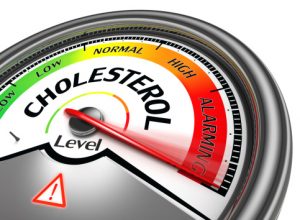 We know that there’s good cholesterol and bad cholesterol, and that if your cholesterol is too high you may be at risk for cardiovascular disease.
We know that there’s good cholesterol and bad cholesterol, and that if your cholesterol is too high you may be at risk for cardiovascular disease.
Since these levels are impacted by diet, it is also important to know how much cholesterol we should have in a day. Continue reading to find out what your daily cholesterol intake should be and some common sources of it.
How much cholesterol intake is recommended in a day
Advertisement
The body actually produces enough of the necessary cholesterol required to perform its physiological and structural functions. This means that we don’t actually need to obtain cholesterol from our diet. However, this does not suggest that cholesterol is unimportant in a structured diet plan as it is recommended by the Institute of Medicine (IOM) that individuals should eat as little cholesterol as possible when adhering to a healthy diet plan.
The previous recommendation was to limit cholesterol intake to no more than 300mg per day (200mg if at high risk of heart disease). However, as of 2015, these guidelines have changed, giving no specific recommendation for cholesterol as a part of a healthy diet.
Part of the reasoning for this guideline change in the fact current research has shown that dietary cholesterol itself isn’t harmful as it only contributes about 15 percent to overall cholesterol levels, but rather saturated fats, trans fats, and added sugars are the culprit. These additional harmful substances are commonly found in foods high in cholesterol, which makes eating them in excess lead to health-related complications.
Sources of cholesterol
Your cholesterol levels are a combination of what’s produced by your liver and the cholesterol that comes from the food you eat. While some foods are higher in cholesterol than others, your blood cholesterol is more likely to be elevated by other components of your diet. Factors that have the biggest influence on blood cholesterol are:
Saturated fats: These are found in foods like cream, cakes, cheese, and butter, and can cause your LDL levels to rise.
Trans fats: Often found in foods like French fries, potato chips, processed foods, and cookies, trans fats are potentially the most dangerous for your cholesterol and can triple your chances of developing heart disease if consumed too often.
Other food components can have a beneficial effect on cholesterol levels. These include:
Unsaturated fats: Vegetable oils, seeds, nuts, and avocados are all good sources of unsaturated fats that can help lower your LDL level.
Mono and polyunsaturated fats: A healthy diet should have the majority of its fat calories made up of mono and polyunsaturated fats. These fats are found in avocados, olive oil, nuts, vegetable oils, and fish, and can help to raise HDL or good cholesterol.
No cholesterol foods: Plenty of foods contain no cholesterol at all and can be enjoyed freely as part of a balanced diet. Plant-based foods like beans, fresh fruit, vegetables, and some nuts and seeds can all be eaten as a cholesterol-free snack.
Know your cholesterol numbers
Your cholesterol levels should be checked regularly though routine blood tests that will tell you your HDL, LDL, total cholesterol, and triglyceride levels. For healthy adults, your HDL level should be 40mg/dL or higher, LDL level should be 100mg/dL or lower, triglycerides 149mg/dL or lower, and total cholesterol 200mg/dL or lower.
Advertisement
Cholesterol is created naturally in your body and is a necessity for many normal functions involving the brain, heart, liver, nerves, and skin. It also helps with the production of hormones, vitamin D, and bile, which help to breakdown fat.
However, having too much cholesterol can put you at risk for developing cardiovascular disease. Healthy adults do not need to consume more than 300mg of cholesterol daily, and can help manage their HDL and LDL levels through eating and avoiding certain foods. Be sure to have your cholesterol checked regularly by your doctor to ensure your risk of developing heart disease is being well managed.
Related: Know your cholesterol ratio to prevent heart disease risk
